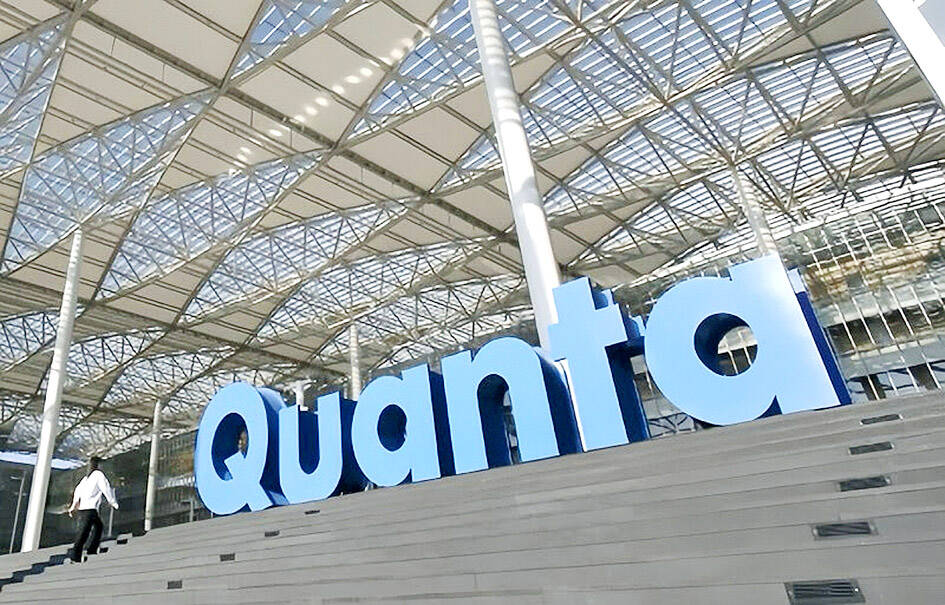Quanta Computer Inc (廣達電腦) yesterday said it is to acquire 7.692 million common shares in Vuzix Corp at US$1.30 per share as part of its long-term investment plans in the US-based maker of smart eyewear.
The share purchase plan was announced after the two companies in November last year entered into a partnership agreement to manufacture next-generation lightweight smart glasses with shipments slated to start later this year.
It is its first tranche of investment in Vuzix, Quanta said in a Taiwan Stock Exchange filing, adding that it would acquire preferred shares of Vuzix during the second and third tranches.

Photo courtesy of Quanta Computer Inc
Quanta’s offer of US$1.30 per share represents a premium of about 51 percent on Vuzix’s closing price of US$0.86 on Friday. US markets were closed on Monday for the Labor Day holiday.
Figures for the second and third tranches have yet to be finalized, but would be less than US$10 million, Quanta said.
The company would hold less than a 19.2 percent stake in the NASDAQ-listed Vuzix after the three tranches are completed, with total investments not exceeding US$20 million, it added.
Vuzix, established in 1997 in Rochester, New York, initially made optical products for the military and the US Department of Defense, but shifted to developing consumer-grade virtual reality (VR) products and is now a leading supplier of smart glasses, and augmented reality (AR) and VR technologies and products.
The deepened partnership between the two firms underscores Quanta’s aim of delivering innovative smart glasses products for the broader markets using waveguides and optical display components sourced from Vuzix, the companies said.
Market researcher TrendForce Corp (集邦科技) said Quanta has been bolstering its technical capabilities in the VR and AR domains in the past few years, and its collaboration with Vuzix is aimed at improving its technology capabilities, providing comprehensive solutions and seizing opportunities in the flourishing virtual market.

Chizuko Kimura has become the first female sushi chef in the world to win a Michelin star, fulfilling a promise she made to her dying husband to continue his legacy. The 54-year-old Japanese chef regained the Michelin star her late husband, Shunei Kimura, won three years ago for their Sushi Shunei restaurant in Paris. For Shunei Kimura, the star was a dream come true. However, the joy was short-lived. He died from cancer just three months later in June 2022. He was 65. The following year, the restaurant in the heart of Montmartre lost its star rating. Chizuko Kimura insisted that the new star is still down

Application-specific integrated circuit designer Faraday Technology Corp (智原) yesterday said that although revenue this quarter would decline 30 percent from last quarter, it retained its full-year forecast of revenue growth of 100 percent. The company attributed the quarterly drop to a slowdown in customers’ production of chips using Faraday’s advanced packaging technology. The company is still confident about its revenue growth this year, given its strong “design-win” — or the projects it won to help customers design their chips, Faraday president Steve Wang (王國雍) told an online earnings conference. “The design-win this year is better than we expected. We believe we will win

Intel Corp chief executive officer Lip-Bu Tan (陳立武) is expected to meet with Taiwanese suppliers next month in conjunction with the opening of the Computex Taipei trade show, supply chain sources said on Monday. The visit, the first for Tan to Taiwan since assuming his new post last month, would be aimed at enhancing Intel’s ties with suppliers in Taiwan as he attempts to help turn around the struggling US chipmaker, the sources said. Tan is to hold a banquet to celebrate Intel’s 40-year presence in Taiwan before Computex opens on May 20 and invite dozens of Taiwanese suppliers to exchange views

While China’s leaders use their economic and political might to fight US President Donald Trump’s trade war “to the end,” its army of social media soldiers are embarking on a more humorous campaign online. Trump’s tariff blitz has seen Washington and Beijing impose eye-watering duties on imports from the other, fanning a standoff between the economic superpowers that has sparked global recession fears and sent markets into a tailspin. Trump says his policy is a response to years of being “ripped off” by other countries and aims to bring manufacturing to the US, forcing companies to employ US workers. However, China’s online warriors